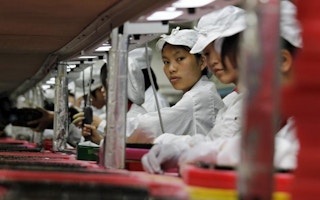Apple Inc is requiring factories to pay recruitment fees for employees instead of saddling new hires with the costs, in a change to a controversial labor practice that has attracted widespread criticism.
The maker of iPhones informed suppliers in October that it would prohibit any worker on an Apple line from being charged such expenses, which is a practice known as bonded labor, the Cupertino, California-based company said in its annual supplier audit released Wednesday.
“That fee needs to be paid by the supplier and Apple ultimately bears that fee when we pay the supplier and we’re OK doing that,” Jeff Williams, Apple senior vice president of operations, said Wednesday in an interview. “We just don’t want the worker to absorb that.”
The study, which gives a peek into what goes into making the gadgets that propelled Apple to post a record $18 billion profit for its most recent quarter. It also underscores the challenge the company faces in balancing how quickly it manufactures devices while striving to ensure good working conditions in international factories. Apple, along with other consumer-electronics makers, long ago turned to Asia for low-cost manufacturing.
“
It is in essence bonded servitude…The suppliers that hire them sometimes don’t know anything about this but the worker’s passport is sometimes held
Jeff Williams, Apple senior vice president of operations
Chief Executive Officer Tim Cook has been trying to combat the perception that workers in emerging markets are mistreated so the company can bolster profits. Worker advocates such as China Labor Watch have been critical of Apple suppliers, with reports that workers in China are forced to work unpaid overtime and are operating in unsafe factory environments.
Ninth study
As part of the study — the ninth from Apple — the company conducted 633 audits covering 1.6 million workers in 19 countries. That’s 182 more audits than in the report covering 2013.
“We care deeply about every worker in Apple’s global supply chain,” Williams wrote in the report. “To improve their lives, we continue to proactively tackle issues that are part of the broader challenges facing our world today — human rights and equality, environmental protection, and education.”
Apple’s product cadence, which requires a quick buildup to meet demand once a new iPhone or iPad is introduced, requires a hiring spree. Suppliers often turn to third-party recruiters to find workers. These workers, frequently from countries foreign to where a factory is located, are charged fees in exchange for the job, sometimes more than one month’s pay.
In November 2013, Bloomberg Businessweek reported that people from Nepal were recruited to work in a factory in Malaysia to make an iPhone camera component. After production at the factory was shut down, the workers were abandoned at the plant for more than a month until the government facilitated their return.
Excessive fees
Apple had said that any fee that was more than one month’s pay was considered excessive and required suppliers to repay the amount when discovered. Suppliers repaid $3.96 million in excess fees to more than 4,500 foreign contractors last year, according to the report. That compares to $3.9 million in 2013. Since 2008, the total amount of reimbursements was almost $21 million to more than 30,000 workers.
“It is in essence bonded servitude,” Williams said. “The suppliers that hire them sometimes don’t know anything about this but the worker’s passport is sometimes held.”
The cases found last year were among first-time audits, Williams said, adding that there were no repeat violations. Some suppliers pushed back on Apple’s new requirement that workers pay zero, he said.
“Every year we raise our standards and we look for opportunities that will either make things simpler or, for places where we feel like we need to be, more rigorous,” he said.
Working hours
Apple, which limits workweeks to 60 hours, except “in unusual circumstances,” found that 92 percent of all workweeks were compliant with that maximum standard. The average hours worked per week was less than 49 while those who put in more than 40 hours each week averaged 55 hours.
That compares to 2013, when Apple reported 95 per cent compliance with the 60-hour maximum. The average hours worked per week was less than 50 while those who put in more than 40 hours each week averaged 54 per week.
In the audit, Apple said it had continued to take steps to weed out the use of minerals from mines from conflict regions such as those in the Democratic Republic of Congo. The company more than doubled the number of verified conflict-free smelters to 135 last year while another 64 are in the process of being verified by a third party.










